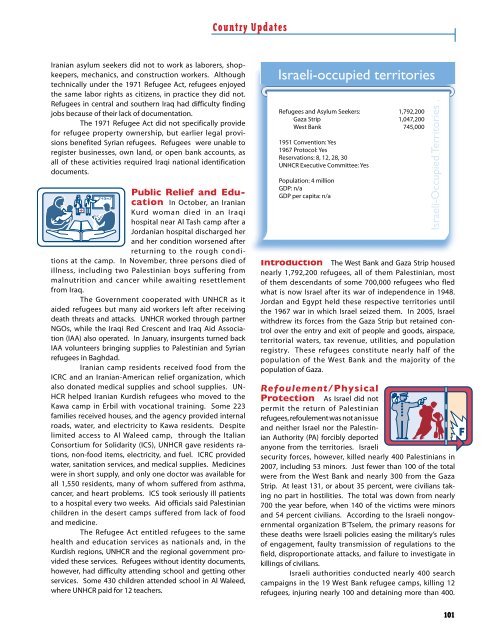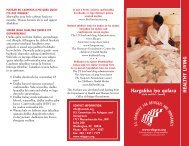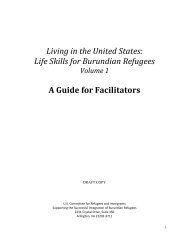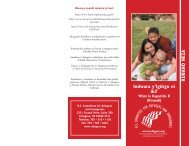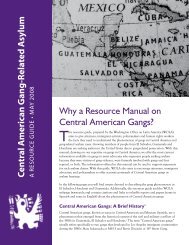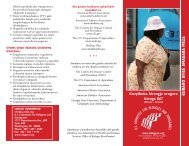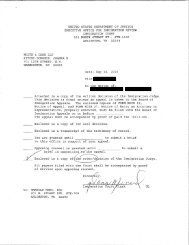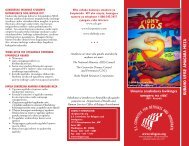Refugees and Asylum Seekers
Refugees and Asylum Seekers
Refugees and Asylum Seekers
Create successful ePaper yourself
Turn your PDF publications into a flip-book with our unique Google optimized e-Paper software.
Iranian asylum seekers did not to work as laborers, shopkeepers,<br />
mechanics, <strong>and</strong> construction workers. Although<br />
technically under the 1971 Refugee Act, refugees enjoyed<br />
the same labor rights as citizens, in practice they did not.<br />
<strong>Refugees</strong> in central <strong>and</strong> southern Iraq had difficulty finding<br />
jobs because of their lack of documentation.<br />
The 1971 Refugee Act did not specifically provide<br />
for refugee property ownership, but earlier legal provisions<br />
benefited Syrian refugees. <strong>Refugees</strong> were unable to<br />
register businesses, own l<strong>and</strong>, or open bank accounts, as<br />
all of these activities required Iraqi national identification<br />
documents.<br />
2+5=7<br />
Public Relief <strong>and</strong> Education<br />
In October, an Iranian<br />
Kurd woman died in an Iraqi<br />
hospital near Al Tash camp after a<br />
Jordanian hospital discharged her<br />
<strong>and</strong> her condition worsened after<br />
returning to the rough conditions<br />
at the camp. In November, three persons died of<br />
illness, including two Palestinian boys suffering from<br />
malnutrition <strong>and</strong> cancer while awaiting resettlement<br />
from Iraq.<br />
The Government cooperated with UNHCR as it<br />
aided refugees but many aid workers left after receiving<br />
death threats <strong>and</strong> attacks. UNHCR worked through partner<br />
NGOs, while the Iraqi Red Crescent <strong>and</strong> Iraq Aid Association<br />
(IAA) also operated. In January, insurgents turned back<br />
IAA volunteers bringing supplies to Palestinian <strong>and</strong> Syrian<br />
refugees in Baghdad.<br />
Iranian camp residents received food from the<br />
ICRC <strong>and</strong> an Iranian-American relief organization, which<br />
also donated medical supplies <strong>and</strong> school supplies. UN-<br />
HCR helped Iranian Kurdish refugees who moved to the<br />
Kawa camp in Erbil with vocational training. Some 223<br />
families received houses, <strong>and</strong> the agency provided internal<br />
roads, water, <strong>and</strong> electricity to Kawa residents. Despite<br />
limited access to Al Waleed camp, through the Italian<br />
Consortium for Solidarity (ICS), UNHCR gave residents rations,<br />
non-food items, electricity, <strong>and</strong> fuel. ICRC provided<br />
water, sanitation services, <strong>and</strong> medical supplies. Medicines<br />
were in short supply, <strong>and</strong> only one doctor was available for<br />
all 1,550 residents, many of whom suffered from asthma,<br />
cancer, <strong>and</strong> heart problems. ICS took seriously ill patients<br />
to a hospital every two weeks. Aid officials said Palestinian<br />
children in the desert camps suffered from lack of food<br />
<strong>and</strong> medicine.<br />
The Refugee Act entitled refugees to the same<br />
health <strong>and</strong> education services as nationals <strong>and</strong>, in the<br />
Kurdish regions, UNHCR <strong>and</strong> the regional government provided<br />
these services. <strong>Refugees</strong> without identity documents,<br />
however, had difficulty attending school <strong>and</strong> getting other<br />
services. Some 430 children attended school in Al Waleed,<br />
where UNHCR paid for 12 teachers.<br />
Israeli-occupied territories<br />
<strong>Refugees</strong> <strong>and</strong> <strong>Asylum</strong> <strong>Seekers</strong>: 1,792,200<br />
Gaza Strip 1,047,200<br />
West Bank 745,000<br />
1951 Convention: Yes<br />
1967 Protocol: Yes<br />
Reservations: 8, 12, 28, 30<br />
UNHCR Executive Committee: Yes<br />
Population: 4 million<br />
GDP: n/a<br />
GDP per capita: n/a<br />
Israeli-Occupied Territories .<br />
Introduction The West Bank <strong>and</strong> Gaza Strip housed<br />
nearly 1,792,200 refugees, all of them Palestinian, most<br />
of them descendants of some 700,000 refugees who fled<br />
what is now Israel after its war of independence in 1948.<br />
Jordan <strong>and</strong> Egypt held these respective territories until<br />
the 1967 war in which Israel seized them. In 2005, Israel<br />
withdrew its forces from the Gaza Strip but retained control<br />
over the entry <strong>and</strong> exit of people <strong>and</strong> goods, airspace,<br />
territorial waters, tax revenue, utilities, <strong>and</strong> population<br />
registry. These refugees constitute nearly half of the<br />
population of the West Bank <strong>and</strong> the majority of the<br />
population of Gaza.<br />
Refoulement/Physical<br />
Protection As Israel did not<br />
permit the return of Palestinian<br />
refugees, refoulement was not an issue<br />
<strong>and</strong> neither Israel nor the Palestinian<br />
Authority (PA) forcibly deported<br />
anyone from the territories. Israeli<br />
security forces, however, killed nearly 400 Palestinians in<br />
2007, including 53 minors. Just fewer than 100 of the total<br />
were from the West Bank <strong>and</strong> nearly 300 from the Gaza<br />
Strip. At least 131, or about 35 percent, were civilians taking<br />
no part in hostilities. The total was down from nearly<br />
700 the year before, when 140 of the victims were minors<br />
<strong>and</strong> 54 percent civilians. According to the Israeli nongovernmental<br />
organization B’Tselem, the primary reasons for<br />
these deaths were Israeli policies easing the military’s rules<br />
of engagement, faulty transmission of regulations to the<br />
field, disproportionate attacks, <strong>and</strong> failure to investigate in<br />
killings of civilians.<br />
Israeli authorities conducted nearly 400 search<br />
campaigns in the 19 West Bank refugee camps, killing 12<br />
refugees, injuring nearly 100 <strong>and</strong> detaining more than 400.<br />
F<br />
101


